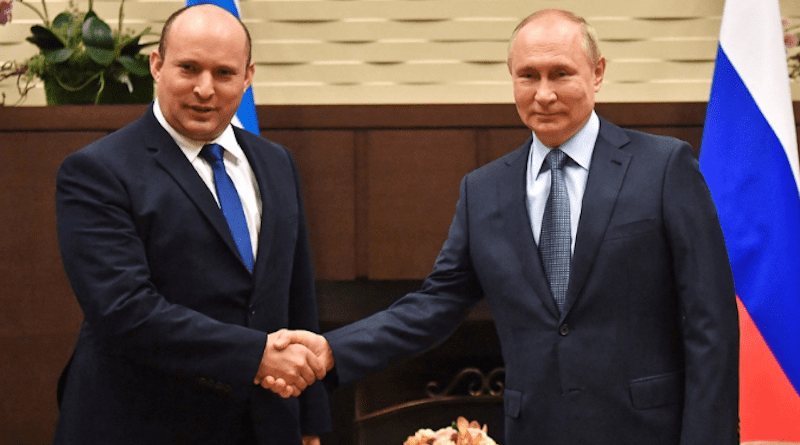The Decline In Israel-Russia Ties – OpEd
By Arab News
By Osama Al-Sharif *
More than a month ago, and two weeks after Russia invaded Ukraine, Israeli Prime Minister Naftali Bennett flew to Moscow on a secret trip to meet with Russian President Vladimir Putin and offer his services as a mediator. He had also made several phone calls to Ukrainian President Volodymyr Zelensky for the same reason. But Bennett’s attempt to maintain a balanced stance on the Ukraine crisis was shortlived. Under US pressure, Israel voted to condemn Moscow’s invasion in the General Assembly last March.
A few days later the Russian Embassy in Tel Aviv conveyed Moscow’s “disappointment” with the Israeli vote. Less than a month later, Israel voted to suspend Russia’s membership of the Human Rights Council. While Russia may have appreciated the delicacy of the Israeli position, it could not forgive statements by Israeli Foreign Minister Yair Lapid on April 15 in which he defended his country’s vote, accusing Russia of “killing innocent civilians.”
Lapid had tweeted on April 4 saying: “It is impossible to remain indifferent in the face of the horrific images from the city of Bucha near Kiev, from after the Russian army left. Intentionally harming a civilian population is a war crime and I strongly condemn it.”
The Kremlin has had enough. On Monday, Russia’s Foreign Ministry summoned the Israeli ambassador in Moscow to protest Lapid’s “anti-Russian attack.” A Foreign Ministry statement said that “there was a poorly camouflaged attempt to take advantage of the situation in Ukraine to distract the international community’s attention from one of the oldest unsettled conflicts — the Palestinian-Israeli one.” This was a rare rebuke by Russia of Israel; a country with which Putin had built strong ties, especially during the term of Benjamin Netanyahu.
The diplomatic debacle prompted Israeli ambassador to the US, Michael Herzog, to announce that “as of today, this (the Bennett mediation) has not produced any breakthrough,” adding that Bennett was no longer in touch with Putin and “is no longer leading the effort to mediate, as he was a few weeks ago.” The Bennett strategy to play both sides had reached the end of the tether.
To add insult to injury, Putin called Palestinian President Mahmoud Abbas on Monday to condemn Israel’s escalation at Al-Aqsa Mosque over the past few days. According to an official Russian statement, the two leaders also discussed negotiations between Russia and Ukraine, as well as “the problems of the Middle East settlement in the context of escalating tensions in the West Bank and East Jerusalem.”
President Putin assured Abbas that Russia would back the Palestinians on the international stage and condemned Israeli forces’ recent confrontation with Palestinian worshippers.
While Israeli officials told local media that the situation was under control, in reality the Russian reaction represents a milestone in bilateral ties. Moscow’s annoyance with Lapid’s attack has to do with the fact that Israel had welcomed more than 12,000 Russians, mostly Jews, who have escaped to Israel since the outbreak of the war last February, compared to about 8,000 Ukrainian Jews. The Russians include critics of Putin, some with political influence inside Russia.
Lapid’s anti-Moscow stance may have to do with his hopes of improving his standing among Russian and Ukrainian Israeli voters. There are at least 1 million Russian Jews in Israel and at least half a million Ukrainian Jews, the majority of whom emigrated in the 1990s.
But Israel’s ties to the Kremlin are strategic and a diplomatic crisis at this stage will hurt Israeli national interests. Russia has a major military presence in Syria and has so far looked the other way as Israeli jets struck pro-Iran militias there. Last Thursday, a Russian military official claimed Syrian air defenses had intercepted a missile that Israeli fighter jets had fired at a target near Damascus. Since the Russian military intervention in Syria in 2015, Moscow and Tel Aviv have coordinated to prevent direct clashes between the Syrian regime and Israel. What worries Israel is that Russia may withdraw from such coordination, or worse, allow the Syrians to use more sophisticated air defense systems to foil Israeli strikes.
Another issue of concern to Israel is the fate of the Vienna nuclear talks with Iran. Russia supports the Iranians in the negotiations and is likely to move closer to anti-Western allies such as Iran, China and to some extent, India, in order to break its diplomatic and economic isolation.
Bennett, who faces domestic challenges as his coalition government struggles to survive, knows that the war in Ukraine is not popular among Israeli voters. If Israel heads to a new election later this year, voters will demand a stronger anti-Russian position. Bennett’s gambit has certainly backfired.
- Osama Al-Sharif is a journalist and political commentator based in Amman. Twitter: @plato010

